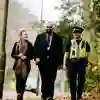




Discover the social, cultural, economic and political factors that lead to crime.
Drawing from real-world examples, you’ll explore the effects of crime on society and how society responds to crime. Our strong links with criminal justice agencies give us unique insight into the world of criminology – so everything you learn is shaped by the latest industry knowledge and techniques.
Get hands-on experience of crime scene investigation, the chance to apply for a Humberside Police placement, and develop in-demand skills. And graduate ready to work in this life-changing industry.
About this course
Criminology and Sociology combine to help us understand how crime happens within social contexts.
You’ll consider your own attitudes to crime, criminals and victims. Explore the relationship between the individual and society, the concept of deviance and how offenders are punished. And be taught by expert staff that specialise in current criminology and criminal justice issues.
We’re one of the few universities in the UK to have a replica crime scene training facility on campus. So you can get to grips with collecting evidence, exploring criminal activity and see the world of forensic science brought to life.
You’ll put the theory into practice on field trips to courts, police stations and prisons, as well as policing projects and placements. All thanks to our close partnerships with local, regional and national criminal justice agencies.
You’ll get the chance to apply for a semester-long placement with Humberside Police. And can also meet significant regional and national employers at our annual Careers in Criminal Justice Fair.
Then graduate with practical experience that gives you an edge over the competition.
How do you stand up to injustice? Together.
Module options
Each year, you’ll study modules worth a certain number of credits, and you need 120 credits per year. Most modules are 20 credits – so you’ll study six modules each year. Some longer modules, such as a dissertation, are worth more. In these cases, you’ll study fewer modules - but the number of credits will always add up to 120. Some modules are compulsory, some are optional, so you can build a course that’s right for you.
Filters
Becoming a Criminologist
This is a foundational 40 credit module designed to introduce Criminology as a discipline in the 21st century and support you in an inclusive learning environment as you transition to higher education. You will learn about the practical and theoretical foundations you need to reach your potential for the years ahead. You will have the opportunity to use our Crime Scene Room to bring theory and practice together. Students are also supported in their academic and study skills, digital literacy, and teamwork to inform future studies.
compulsory
40 credits
Global Issues - Local Impact
The world is facing a number of global challenges that no country by itself is able to tackle. Disarmament and international peace, energy poverty, food and water resources, and climate change are just some of today's challenges. You'll learn about these global issues and how they affect people's lives in local communities.
compulsory
20 credits
Crime, Deviance and Society
Look back to the origins of criminology by focusing upon the concepts and study of deviance. You'll trace how crime and deviance have been - and continue to be - deeply intertwined.
compulsory
20 credits
Social Research in Practice
The module takes an integrative approach to research ethics and design. It's a foundation for skills in understanding research and practical skills for conducting independent research.
compulsory
20 credits
Sociological Storytelling - Making Sense of Society
Look at imaginative visions of the past, present, and future to better understand contemporary social issues. Using sociological tools and concepts, you'll identify ideologies and social structures that shape people's experiences. You'll study themes such as gender and sexuality, poverty and wealth, technology, and social change.
compulsory
20 credits
Current Challenges in Criminology
Explore current insecurities and examine how private troubles and public issues are linked. You'll develop your ability to link academic theory and findings to real-world situations like modernity, globalisation and its (broken) promise; colonial legacies and neo-colonial realities; and migration and dislocation.
compulsory
40 credits
Sexuality, Deviance, and Race: Visuals of Society
In our day to day lives, we experience and witness ethical challenges, injustices and violence. This module exposes injustices and explores the power of representation. Visual analysis of the complex relationship between sexuality, deviance, and race on national and international levels will feed into broader social discourses. Case studies and internet usage will provide knowledge of the mechanisms that are able to produce and recognise the power of the image – both human and object.
compulsory
20 credits
Getting Ready for the Dissertation
This module prepares you for your final year and your dissertation research project. You will have the opportunity to engage with agencies and the challenges they are facing. You will discover the diversity of potential research topics and methodological approaches.
compulsory
20 credits
Offending and Victimisation
Why do burglars choose some houses and not others? Does alcohol make people violent? How do offenders think about their chances of getting caught? How does being a victim affect mental health and how does childhood adversity affect crime as an adult? This module focuses on the individual, as a victim, an offender, or both. It explores how people make decisions to commit crime and how being a victim of crime affects behaviour.
optional
20 credits
Our facilities

Playlist
Dr Helen Nichols
Course overview
2 mins
Your course in their words
Student Story
2 mins
Fred Gough - Criminology student story
Student Story
2 mins
Police Placement
Course Highlight
2 mins
Life on campus
University life
2 mins
Featured academics
We were one of the first to teach criminology degrees over 50 years ago.
We’re still at the forefront today with research leaders on issues such as violent crime, social justice and desistance, prisons and restorative justice, cybercrime, and intelligence.

Dr Helen Nichols
Reader in Criminology
Helen’s research focuses on the experience and impact of contemporary adult male imprisonment. She has published a book on the subject and continues to actively research in the field of penology, currently exploring the wellbeing of prison governors.

Dr Alice Rizzuti
Lecturer
Alice’s expertise is in food crime and the involvements of organised crime and mafia-type groups as well as green criminology. She was a Research Associate for the CRIME - Countering Regional Italian Mafia’s Expansion – project.
Entry Requirements
What do I need?
This course is currently available through Clearing, which means our entry requirements are a bit different to what they would normally be.
At Hull, you're a name not a number. During Clearing, we look at all of your qualifications and experience, not just your academic grades. We may be able to offer you a place whatever your situation. Get started by completing our eligibility checker, and find out immediately if you could study at the University of Hull.
Have questions? Our admissions team will be happy to help.
Fees & Funding
How much is it?

Future prospects
Demand for Criminologists with insight into the impact of crime on society is higher than ever.
The knowledge and skills gained on our Criminology degrees are genuinely career enhancing. Through placements, work experience and a diverse course of study and research, you’ll gain the key skills that are in demand across a wide range of careers.
You could go onto roles within the police force, HM Prison Service, the Probation Service, legal professions, social work, the charity sector or the Civil Service.
Become part of the next generation of futuremakers
Like what you've seen? Then it's time to apply.
The standard way is to apply through UCAS. This will give you the chance to showcase your skills qualities and passion for the subject, as well as providing us with your academic qualifications.
Not ready to apply yet?
Visit our next Open Day, and see all that the University of Hull has to offer. Talk to our lecturers about your subject, find out what university is really like from our current students, and take a tour of our beautiful campus and amazing facilities.
You may also be interested in...
94% employability (Criminology) UK domicile full-time first degree leavers; Higher Education Graduate Outcomes statistics, for the academic year 2022/23, published by the Higher Education Statistics Agency June 2025.
Criminology is ranked joint 4th in the UK for Value Added Score. The Guardian University Rankings 2026.
All modules on this course page are subject to availability and this list may change at any time.